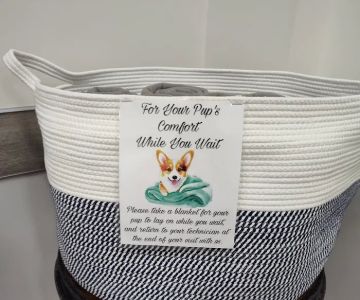How to Become a Veterinary Ophthalmologist
If you're passionate about both animals and the science of vision, becoming a veterinary ophthalmologist may be the perfect career path for you. As someone who has always been fascinated by the intricacies of animal health, I found the field of veterinary ophthalmology to be both rewarding and challenging. In this article, I'll guide you through the steps of becoming a veterinary ophthalmologist, from education requirements to hands-on training and the day-to-day responsibilities of the job.
1. Understanding Veterinary Ophthalmology
Before diving into the specifics of becoming a veterinary ophthalmologist, it's important to understand what this specialty entails. A veterinary ophthalmologist is a veterinarian who specializes in diagnosing and treating eye diseases in animals. This includes a range of conditions, from common eye infections to more complex issues like cataracts, glaucoma, and even eye cancer. Veterinary ophthalmologists work closely with general veterinarians to provide specialized care for pets, farm animals, and even zoo animals.
1.1 Why Choose Veterinary Ophthalmology?
Throughout my journey in veterinary medicine, I realized that choosing a specialty is all about passion. Veterinary ophthalmology appealed to me because it combines my interest in general animal health with my fascination for the intricacies of the eye. Treating animals' vision problems can have a profound impact on their quality of life, and there's something incredibly rewarding about restoring or maintaining an animal's sight.
2. The Educational Path to Becoming a Veterinary Ophthalmologist
Like all veterinary specialties, becoming a veterinary ophthalmologist requires a significant investment in education and training. The journey begins with obtaining a veterinary degree, followed by specialized training in ophthalmology.
2.1 Completing a Veterinary Degree
The first step is earning a Doctor of Veterinary Medicine (DVM) degree, which typically requires four years of study at an accredited veterinary school. This includes rigorous coursework in animal anatomy, physiology, pathology, and medicine. During this time, you'll also complete hands-on clinical training to gain practical experience with animals.
2.2 Gaining Experience in Veterinary Medicine
Before specializing, it's essential to work as a general veterinarian for several years. I recommend gaining as much practical experience as possible in different areas of veterinary care. This not only strengthens your foundation in animal health but also helps you determine if a specialty like ophthalmology is the right fit for you.
3. Specializing in Veterinary Ophthalmology
After completing the DVM program, the next step is to pursue a specialty in ophthalmology. This typically involves completing a residency program in veterinary ophthalmology, which lasts about three to four years. During this time, you'll undergo intense training in diagnosing and treating a wide range of eye conditions in animals, including surgeries like cataract removal and eyelid reconstruction.
3.1 What Does a Residency Program Entail?
Residency programs are highly competitive and require you to have a solid foundation in veterinary medicine. During the residency, you’ll work under the supervision of board-certified veterinary ophthalmologists, gaining hands-on experience and refining your skills. This is the time when you’ll begin to develop your own expertise in the field, performing complex procedures and learning to manage challenging cases.
3.2 Board Certification and the Path to Becoming an Expert
After completing your residency, the next step is to become board-certified by the American College of Veterinary Ophthalmologists (ACVO). Certification involves passing a series of exams that test your knowledge and ability to diagnose and treat ocular diseases in animals. This is an important milestone in your career, as it establishes your credibility as an expert in veterinary ophthalmology.
4. The Skills You’ll Need to Succeed as a Veterinary Ophthalmologist
In addition to the formal education and training required to become a veterinary ophthalmologist, there are several key skills that are essential for success in this field.
4.1 Attention to Detail
As a veterinary ophthalmologist, you’ll need a keen eye for detail. Diagnosing eye conditions often involves identifying subtle signs that may not be immediately obvious. Whether it's interpreting a pet’s medical history or analyzing the results of a diagnostic test, being thorough and observant is critical to providing the best care possible.
4.2 Strong Communication Skills
In veterinary ophthalmology, communication is key. You’ll need to explain complex conditions and treatment plans to pet owners in a way they can understand. I’ve found that being able to break down medical jargon and make clients feel comfortable and confident in your abilities is crucial to building trust.
5. Career Opportunities for Veterinary Ophthalmologists
Veterinary ophthalmologists are in high demand, and there are many career opportunities available for those who complete their training. Whether you choose to work in private practice, join a veterinary clinic, or teach at a university, the options are plentiful. Some veterinary ophthalmologists also work with research institutions or pharmaceutical companies, contributing to the development of new treatments and technologies for animal eye care.
5.1 Private Practice vs. Academic Careers
After completing my training, I considered both private practice and teaching at a veterinary school. While private practice allows for direct patient care and the opportunity to build a relationship with clients, an academic career offers the chance to teach and conduct research. Both paths are fulfilling, and your choice will depend on your interests and career goals.
5.2 Working with Specialized Animal Care Centers
Another exciting opportunity is to work with specialized animal care centers that provide advanced ophthalmology services. These centers cater to pets with complex eye conditions and require highly skilled veterinarians to manage these challenging cases. Working in this environment allows you to focus exclusively on ophthalmology and collaborate with other specialists in the field.
6. The Rewards of Being a Veterinary Ophthalmologist
Becoming a veterinary ophthalmologist is both a challenging and rewarding career. I find it incredibly fulfilling to help animals regain their sight and improve their quality of life. Whether it's performing a successful surgery or helping a pet with a chronic eye condition manage their symptoms, the satisfaction that comes from making a difference in an animal’s life is immeasurable.
6.1 Making a Real Impact on Animal Welfare
One of the most rewarding aspects of being a veterinary ophthalmologist is knowing that your expertise can significantly improve the health and well-being of animals. There’s nothing more gratifying than seeing an animal that was once unable to see, experience the world through their restored vision.











